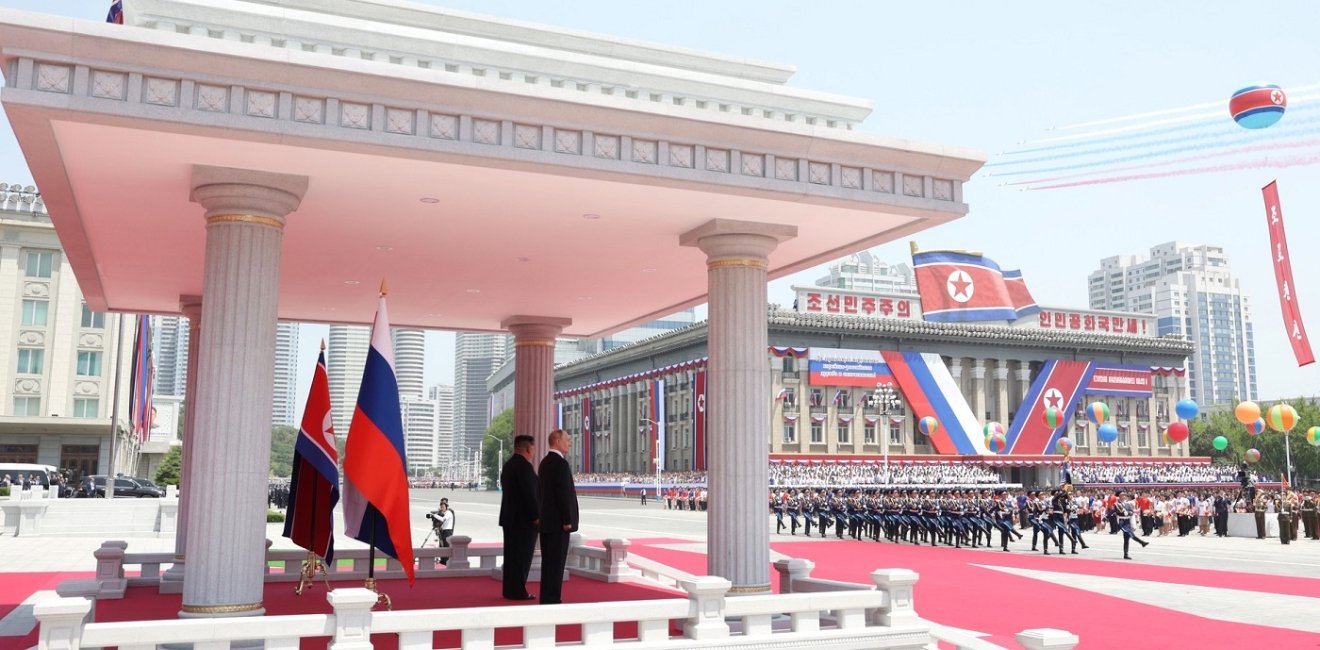
A blog of the Kennan Institute
For decades, Russia has pursued a policy of “diplomatic equidistance” between South Korea and North Korea. This policy provided Russia with important stakes in the stability of the Korean peninsula. By offering to mediate with North Korea during periods of heightened tension, and enforce sanctions to slow nuclear proliferation, Russia enjoyed access to the thriving South Korean economy and opportunity to influence regional affairs. This long-standing policy came to an abrupt end in June with the signing of a Comprehensive Strategic Partnership Treaty, between North Korea and Russia, during Vladimir Putin’s visit to Pyongyang.
The treaty comes on top of months of growing cooperation in times of great need for both countries. North Korea has provided Russia with massive military assistance to sustain its war effort in Ukraine, amid dwindling stockpiles of equipment and worsening labor shortages. Russia in turn has helped to hobble the UN sanctions regime on North Korea and provide it relief from long running economic woes worsened by the COVID-19 pandemic. The treaty formalizes these growing ties and expands cooperation between the two countries into a mutual defense pact.
The new alliance also indicates a reappraisal of Russia’s long-term national interests by Putin in the wake of the 2022 invasion of Ukraine. It demonstrates an acceptance of geopolitical instability as a precondition for breaking the existing international order. This entails a pivot toward deepening military cooperation with fellow pariah states and a willingness to support some nuclear proliferation as a means of establishing alternative poles of geopolitical power that are unassailable by the West. It is also, however less obviously, a strategy for balancing against Chinese power which may rise up to fill any void in global leadership.
A Bulwark against the West
The Comprehensive Strategic Partnership represents an attempt to combine the strengths of each country’s defense industry to exceed those of the United States and its allies in production capacity and to achieve strategic parity by leveraging nuclear weapons. For Russia this has meant secure, long-term support for its war in Ukraine. What North Korea has gotten in return is less clear, but there is mounting circumstantial evidence that Russia has helped North Korea make significant advances in its missile program.
Since Putin's proposal to assist North Korea in developing its “space” and “rocketry” programs during Kim Jong-un’s September 2023 visit to Russia’s Vostochny Cosmodrome, Russia has fired 50 or more North Korean-made ballistic missiles into Ukraine. This has provided a test of North Korea’s new weapons in combat and in the process identified deficiencies in their performance, which may assist future research and development.
Substantial improvements in North Korea’s satellite launch capability have also followed. On November 22, 2023, North Korea successfully launched its first domestically produced satellite. Six months later, the effects of deeper cooperation were visible, when an attempted satellite launch on May 27, 2024, featured engines powered by low-oxygen kerosene propellant, a technology commonly used for launching satellites in Russia that had not been seen before in North Korea. These advances in North Korea’s capability to put a functional satellite in orbit indicate, by proxy, improvements in its ability to launch an intercontinental ballistic missile (ICBM) with a nuclear payload that survives reentry into the atmosphere.
A June 26 missile launched by North Korea featured a test of Multiple Independently Targeted Reentry Vehicles (MIRVs), a development which makes these previous advances in satellite launch even more concerning. MIRVs are a system for delivering numerous miniaturized nuclear warheads to different targets on a single missile. ICBMs armed with MIRVs would allow North Korea to seriously challenge US missile defenses. The rapid and unexpected progress in developing MIRVs—a technology long mastered by Russia—along with its timing, suggest substantial Russian technical assistance, development anticipated in my Russia-File piece from last April.
Finally, recent imagery of Pyongyang’s Sunan International Airport shows the development of an airborne early warning system (AEWS) taking shape. The advanced system of battlefield command and control used to coordinate air and missile strikes is being built atop one of North Korea’s handful of Soviet-era IL-76s, and it strongly resembles an iteration of the Russian A-50 Beriev.
A Hedge Against China
The strengthening of military ties with North Korea has been hailed by the Kremlin as a major step forward in its campaign to create a new, multipolar order free from Western domination. China, which would no longer be challenged in Asia by the United States in this envisioned system, has echoed similar pronouncements by Russia about the need for a multipolar order. Rhetoric aside, it is far from clear that Beijing is actually interested in cultivating a world in which its rising potential as a superpower is constrained by other geopolitical poles.
China’s global ambitions ultimately complicate its long-term commitments to Russia and North Korea. To become the preeminent global power, China needs Russia and North Korea as military partners to challenge the West. It also needs Russia as a stakeholder in an alternative economic system alongside a broad anti-Western coalition, in such organizations as the BRICS and the Asian Infrastructure Investment Bank. This makes cooperation with Russia and North Korea valuable to China, but ultimately less valuable than access to Western markets, upon which China’s economic development has depended. China has an interest in keeping Russia and North Korea powerful only to the extent to which it can instrumentalize their power and keep them in supporting roles.
Being a supporting partner to China is an inherently insecure position. China has shown its willingness to violently split with and harshly discipline its partners. China has used its outsized economic influence as North Korea’s largest trading partner to pressure Pyongyang to conform to its interests. China also previously risked nuclear war with the Soviet Union in 1969 in a violent dispute over a relatively tiny piece of land in the Ussuri river. The claims underlying that conflict are still unresolved. Closer ties between Russia and North Korea therefore provide both with additional leverage to remain independent of Chinese influence.
The alliance encroaches on Chinese interests, but it gives Beijing uncomfortably few options for responding. Pushing back against these moves for now would risk a defiant reaction from North Korea, potentially pushing it even closer to Russia. It could also cause the Kim regime to assert its independence with belligerent and destabilizing actions. This, in turn, could provoke a tightening of the emerging tripartite alliance between America, Japan, and South Korea. Chinese pressure on Russia could similarly cause Russia to lean even more heavily towards its rivals in Vietnam and India, countries Putin happened to visit immediately after his June visit to North Korea.
Russia’s profound shift toward North Korea has allowed Putin to seize the initiative in rearranging the “grand chessboard” of Eurasia for now. But the move has come with great long-term risk. The alliance has made its war in Ukraine increasingly global in scale. It has also wagered Russia’s future on the achievement of a profoundly different international system, one which may face stiff resistance not only from the West, but from China as well.
The opinions expressed in this article are those solely of the author and do not reflect the views of the Kennan Institute.
Author


Kennan Institute
The Kennan Institute is the premier US center for advanced research on Eurasia and the oldest and largest regional program at the Woodrow Wilson International Center for Scholars. The Kennan Institute is committed to improving American understanding of Russia, Ukraine, Central Asia, the South Caucasus, and the surrounding region through research and exchange. Read more

Explore More in The Russia File
Browse The Russia File
Chechnya as a Model of Modern Russia

Russia’s Indigenous Communities and the War in Ukraine

Gas and Power in a Changing US–Russia Relationship



